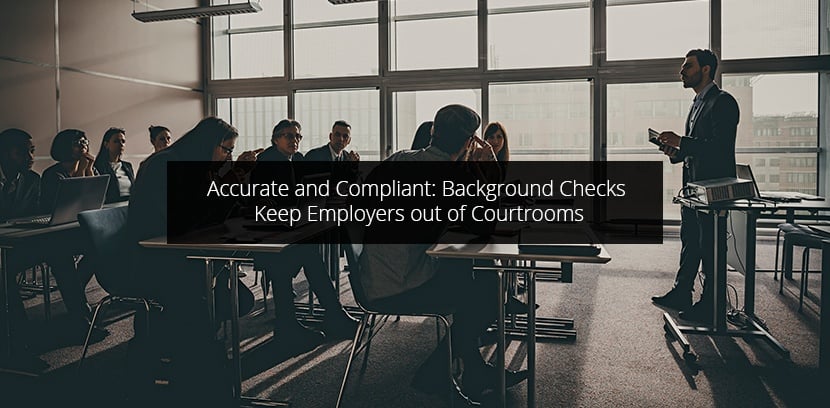What is a 613 Letter under the Fair Credit Reporting Act?

The Fair Credit Reporting Act (FCRA) is federal regulation enacted to protect consumer information and designates how that information is allowed to be used by consumer reporting agencies (CRA). The increasingly complex legislation has been amended several times since its inception in 1970 and is still up to interpretation and enforcement by the Federal Trade Commission. Section 613 of the FCRA has been under question by some employers vigilant to follow the law and mitigate the risk of litigation.
While not offering legal advice, the intention of this post is to assist employers with a clearer understanding of FCRA section 613.
What is a 613 Letter under the Fair Credit Reporting Act?
FCRA Definitions
The FCRA specifies procedures used to ensure confidentiality, privacy, accuracy, and relevancy of information collected about consumers. In relation to employment, sections of the FCRA are used to define terms such as:
- Consumer Report (Section 603(d)) - Written, oral, or other communication of any information by a consumer reporting agency of a consumer’s credit worthiness, credit standing, credit capacity, character, general reputation, personal characteristics, or mode of living which is used or expected to be used or collected for the purpose of serving as a factor in establishing the consumer’s employment eligibility.
- Consumer Reporting Agency (Section 603(f)) - Any person which regularly engages in the practice of obtaining or evaluating consumer credit information or other consumer reports for third parties.
- Employment Purposes (Section 603(h)) - In connection with a consumer report, employment purposes means the consumer report is used for the purpose of evaluating a consumer for employment, promotion, reassignment or retention as an employee. Also referred to as "Permissible Purpose."
- Adverse Action (Section 603(k)) - Denying employment or any other employment decision that adversely affects any current or prospective employee.
Sections 604 - 612 defined
- 604 - Permissible purpose and the conditions for furnishing and using consumer reports for employment purposes
- 605 - Requirements relating to information contained in consumer reports
- 606 - Disclosure to the consumer that a consumer report will be obtained as a condition of employment
- 607 - Compliance procedures for CRAs including accuracy, disclosure, providing notice of responsibility to furnishers, and restriction of reselling the consumer report
- 609 - Consumer rights to disclosure of their consumer report
- 610 - Conditions and form of the consumer report disclosure
- 611 - Procedures in case the consumer disputes accuracy of the report
- 612 - Charges for consumers to obtain copies of their reports (one free per year)
- 613 - CRA protections for consumers when adverse information is discovered that may affect their employment
Section 613: Strict Procedures or Letter of Notice?
The challenge with section 613 of the FCRA is the defined process for consumer reporting agencies if there was a public record of information that would likely adversely affect a consumer's ability to obtain employment. The CRA has two options when adverse information is found:
- Notify the consumer that the negative information has been found and also include the name and address of the person who will be receiving the information
- Maintain "strict procedures" that ensures the information collected is accurate and up to date
When assessing the current litigious environment, especially in relation to FCRA class action and employment, employers are left wondering which of these processes their background screening company follows; Notification by letter, verification of accurate information, or both?
Time and cost is typically a factor when employers need background checks. When an employer relies on CRAs promising "cheap" or "instant background checks", they may be unable to verify the accuracy or validity of the "database" information provided. Since they cannot ensure the accuracy, employers run the risk of violating section 613 if they do not ensure their background screening company is notifying consumers of the negative information.
The timing of notification of the consumer is also ambiguously stated in section 613 (a)(1) as "at the time such public record information is reported to the user of such consumer report, notify the consumer..." Employers have been taken to court for notifying the consumer a day later than the party requesting the report.
Recommendation: Notify Consumer with 613 Letter
A 613 Letter is the notice the CRA sends to the applicant if a potentially negative item was discovered in their background screening report.
This letter is in lieu of requiring court searches to verify the record at the source (county court, DMV, etc.). Although VeriFirst recommends our clients conduct direct-from-the-source background checks, it can delay the turnaround time and increase the cost if a researcher is required to verify information before releasing it to the client. 613 Letters are typically sent on “database” searches, since they are not considered the most accurate and up-to-date source.
With regards to timing and mitigating the risk of litigation to the employer, VeriFirst provides a bonus service to our clients. When a client runs a database background check, VeriFirst will send a 613 Letter free of charge to the applicant’s address and hold screening results till notification is sent. Once the letter is post-marked (sent), we will release the records to the employer.
Often these records don’t matter nor do they factor into the employer's decision, therefore it is not considered an adverse action notice. A 613 Letter is more of a notification to the applicant that information was discovered during a background check and that information could possibly have a negative impact on their ability to obtain employment. In essence, this letter serves as a "heads-up" notification to the applicant / consumer.
Have questions? Our FCRA-certified staff can help. Contact us
Share this
You May Also Like
These Related Stories

Accurate and Compliant: Background Checks Keep Employers out of Courtrooms

Common HR Violations of the FCRA

